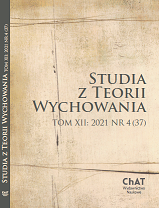„JA, BAŁWAN” – z dzieckiem w świat spraw trudnych, egzystencjalnych i ostatecznych
"I, SNOWMAN" – with a child into a world of difficult, existential and ultimate issues
Author(s): Anna SaneckaSubject(s): Social Sciences
Published by: Wydawnictwo Naukowe ChAT
Keywords: death; dying; friendship; thanatopaedagogy; accompanying the dying ones
Summary/Abstract: The aim of the article is to present a theatrical performance for children Ja, Bałwan (I, Snowman) as an introduction of the youngest audience to the sphere of thanatology - passing away, death, accompanying the dying. In the research analysing of the content of the play is used to interpret it in the context of philosophical considerations of M. Heidegger, K. Jaspers and E. Levinas concerning death, dying, inevitability and existence and its end. In the context of the mentioned above performance, the issues of: death as a border situation, tanatopaedagogy, "my" death and death of the another, responsibility for the dying, accompanying in dying, the purpose of life and dying as its inevitable end have been discussed in the article. Based on the of the above mentioned philosophers’ thoughts about death and the concepts of specialists in the field of thanatopaedagogy, it was concluded that the content of the analysed performance and the way it deals with the subject of passing away and the end of existence may contribute to the disenchantment and taming of death and the implementation of the general assumptions of tanatopaedagogy as well as humanistic education. Celem artykułu jest prezentacja spektaklu teatralnego dla dzieci Ja, Bałwan, jako wprowadzenia najmłodszej widowni w tematykę tanatologiczną – odchodzenia, śmierci, towarzyszenia przy umieraniu. W artykule dokonano analizy treści spektaklu i zinterpretowano go w kontekście filozoficznych rozważań M. Heideggera, K. Jaspersa i E. Levinasa dotyczących śmierci, umierania, nieuniknioności oraz egzystencji i jej kresu. W artykule, w kontekście prezentowanego spektaklu, poruszono więc kwestie: śmierci jako sytuacji granicznej, tanatopedagogiki, śmierci „mojej” i śmierci innego, odpowiedzialności za umierającego, towarzyszenia w umieraniu, celu życia oraz umierania jako jego nieuniknionego końca. Opierając się na przekonaniach wymienionych filozofów na temat śmierci oraz poglądach specjalistów w zakresie tanatopedagogiki stwierdzono, że treść omawianego spektaklu i sposób poruszania w nim tematyki odchodzenia i kresu egzystencji może być przyczynkiem do odczarowania i oswojenia śmierci oraz wcielenia w życie naczelnych założeń tanatopedagogiki i kształcenia humanistycznego.
Journal: Studia z Teorii Wychowania
- Issue Year: XII/2021
- Issue No: 4 (37)
- Page Range: 149-165
- Page Count: 17
- Language: Polish

